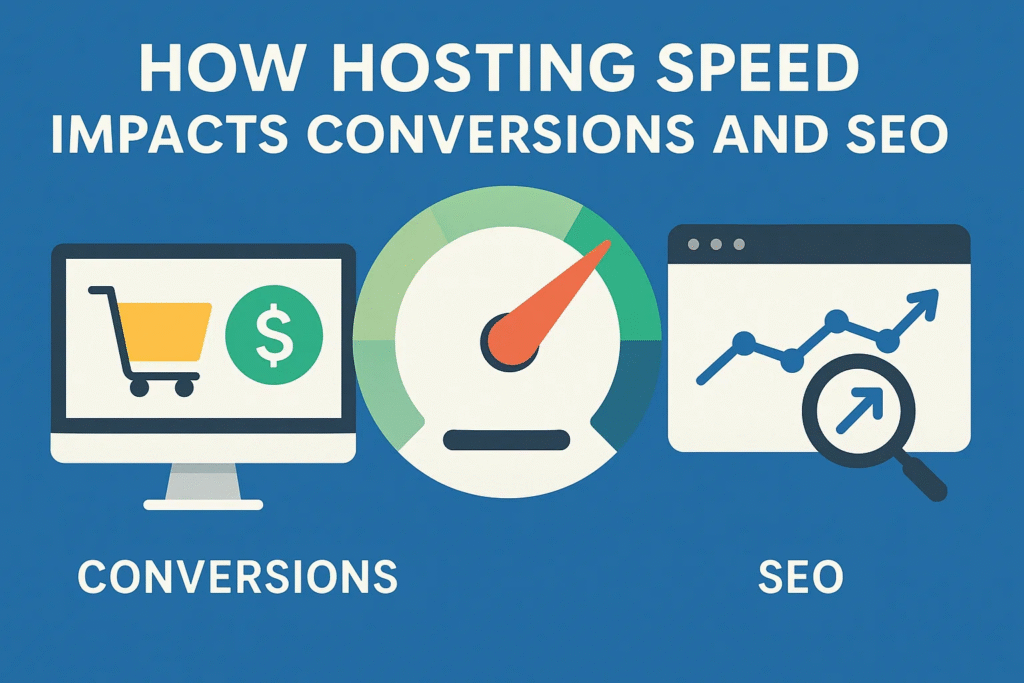Website speed is no longer just a technical metric — it’s a direct factor influencing your conversions, revenue, and search rankings. In the digital world where attention spans are shrinking and competition is just a click away, a slow-loading site can cost you customers, credibility, and visibility on search engines. Hosting speed, which is the foundation of website performance, plays a major role in this.
This article explores in detail how hosting speed affects your website’s conversions and SEO, why it matters for user experience, and how you can improve it for better business outcomes.
1. Understanding Hosting Speed
Hosting speed refers to how quickly a web server responds to requests and delivers website content to users. It includes server response time, bandwidth, caching mechanisms, and uptime reliability. Even with optimized code and images, a poor hosting environment can slow your site dramatically.
When you choose a hosting plan, you’re essentially renting a space and computing power on a server. The quality of that server and the provider’s infrastructure determines how efficiently your website loads.
2. Why Hosting Speed Matters More Than Ever
-
User impatience: Studies show 53% of mobile users abandon a site if it takes longer than 3 seconds to load.
-
Revenue loss: Every extra second of load time can reduce conversion rates by up to 7%.
-
Search visibility: Google uses page speed as a ranking factor for both desktop and mobile searches.
-
Brand image: A sluggish site damages your credibility and user trust.
3. How Hosting Speed Affects Conversions
3.1 First Impressions
Speed creates the first impression. If a user visits your site and it loads instantly, it signals professionalism and reliability. A delay, however, can frustrate them before they even view your offer.
3.2 Reduced Bounce Rates
Fast websites encourage visitors to explore multiple pages. When your site loads slowly, bounce rates skyrocket because users hit the back button.
3.3 Smooth Checkout Process
For e-commerce sites, hosting speed can make or break the checkout process. High latency can cause cart abandonment, directly impacting sales.
3.4 Mobile Users
Since mobile users are often on slower connections, a sluggish host exacerbates load times and causes even higher drop-offs.
4. How Hosting Speed Impacts SEO
4.1 Google Page Experience
Google considers Core Web Vitals (LCP, FID, CLS) and page speed as ranking signals. If your host cannot deliver fast server response times, your SEO performance suffers.
4.2 Crawl Budget
Search engine bots have a limited time (crawl budget) to index your website. Faster servers allow more pages to be crawled and indexed efficiently.
4.3 User Engagement Signals
Bounce rate, dwell time, and click-through rates indirectly influence SEO rankings. Slow sites negatively affect these metrics.
4.4 Competitive Advantage
If your competitors’ websites load faster, they’re more likely to rank higher and attract more organic traffic.
5. Table: Hosting Speed, Conversions & SEO Metrics
| Factor | Impact on Conversions | Impact on SEO | Example / Insight |
|---|---|---|---|
| Server Response Time (TTFB) | Faster checkout, reduced cart abandonment | Direct ranking signal through Core Web Vitals | TTFB <200ms recommended by Google |
| Bandwidth & Resources | Handles spikes in visitors without downtime | Better crawling during high-traffic periods | More bandwidth = fewer slowdowns |
| CDN & Caching | Reduces load times for global users | Improves mobile rankings | Content cached closer to users |
| Uptime Reliability | Keeps website accessible 24/7 | Maintains consistent indexing | Target 99.9% uptime |
| SSL / Security Integration | Increases user trust, reduces drop-off | HTTPS is a ranking factor | Free SSL + fast host = better SEO |
| Hosting Location (Data Centers) | Lower latency for target regions | Better regional rankings | Choose a server near your main audience |
| Scalability of Hosting Plan | Supports traffic growth without degradation | Ensures long-term performance | Upgrade to VPS or cloud hosting as you grow |
| Customer Support of Hosting | Quick fixes reduce downtime | Indirectly helps SEO by maintaining uptime | 24/7 support crucial |
6. Case Studies and Research Data
-
Amazon: Reported that every 100 milliseconds of latency cost them 1% in sales.
-
Walmart: Improved conversions by 2% for every 1-second improvement in load time.
-
Google: Reduced search latency by 0.5 seconds, resulting in 20% more traffic.
These examples show that hosting speed isn’t theoretical; it’s a measurable driver of business outcomes.
7. Key Elements That Affect Hosting Speed
7.1 Server Hardware
High-performance CPUs, SSD storage, and optimized configurations result in faster load times.
7.2 Server Location
Physical distance between the user and the server affects latency. Choose a data center close to your main audience.
7.3 Shared vs. VPS vs. Dedicated Hosting
-
Shared hosting: Affordable but limited resources, suitable for small sites.
-
VPS hosting: More control and resources, better speed.
-
Dedicated hosting: Entire server for your website, best speed but costlier.
7.4 Content Delivery Networks (CDNs)
CDNs distribute your website across multiple servers worldwide, ensuring faster delivery.
7.5 Caching Mechanisms
Server-side caching significantly reduces load times.
8. Improving Hosting Speed for Better Conversions
-
Upgrade Hosting Plan: Move from shared hosting to VPS or cloud hosting.
-
Use a CDN: Deliver content closer to your visitors.
-
Enable Caching: Server-level and browser caching improve repeat visit performance.
-
Optimize Database: Clean up old data and use indexing.
-
Monitor Server Uptime: Use tools like UptimeRobot or Pingdom.
9. Improving Hosting Speed for Better SEO
-
Minimize Server Response Time (TTFB): Aim for under 200ms.
-
Use HTTPS: Secure hosting is a ranking factor.
-
Compress Images & Files: Reduces payload.
-
Leverage Gzip/Brotli Compression.
-
Optimize for Mobile: Ensure mobile-friendly hosting.
10. Hosting Speed Testing Tools
-
Google PageSpeed Insights
-
GTmetrix
-
Pingdom Tools
-
WebPageTest
These tools help you measure how your hosting environment affects performance and SEO metrics.
11. Choosing the Right Host
When selecting a hosting provider, look beyond price and focus on:
-
Performance guarantees (uptime, SSD servers, caching technology)
-
Scalability options
-
Customer support availability
-
Location of data centers
-
Security measures
12. Future of Hosting and Speed
With the rise of cloud infrastructure, edge computing, and AI-powered load balancing, hosting is becoming smarter and faster. Websites that adopt these technologies will gain a performance edge over competitors.
13. Key Takeaways
-
Hosting speed directly affects user experience, conversions, and SEO rankings.
-
A slow host undermines your marketing efforts, no matter how great your content or design is.
-
Investing in a reliable hosting provider offers one of the highest ROIs for online businesses.
14. Conclusion
The speed of your web hosting isn’t just a back-end consideration — it’s a critical factor influencing how users perceive your brand, how much they buy, and how well you rank in search engines. By prioritizing hosting speed, you not only improve your website’s performance but also build a stronger foundation for your digital success.

